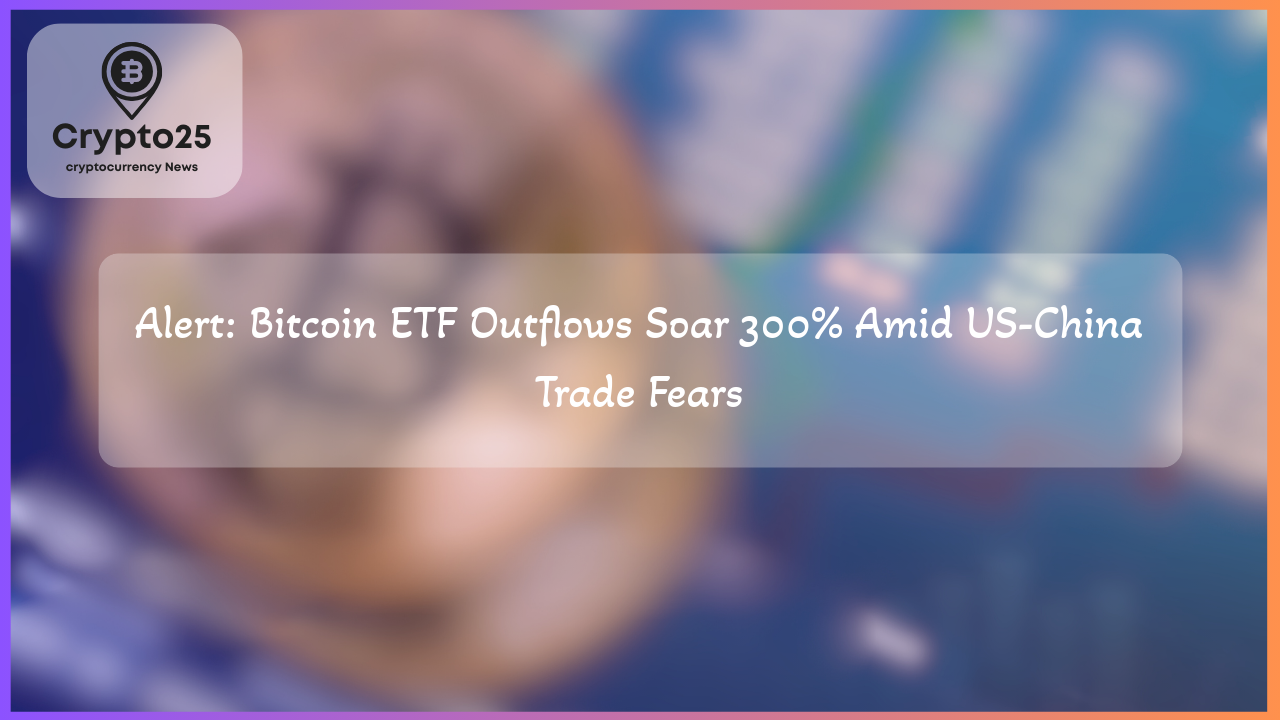
Investor Sentiment Drives Massive Outflows from Bitcoin ETFs Amid Trade Concerns
A sharp surge in outflows from U.S.-based spot Bitcoin ETFs last week highlights the influence of global trade tensions on the cryptocurrency market. As investors reassess risk amid tariff uncertainties, Bitcoin ETFs witnessed record withdrawals, reflecting a broader market sentiment shift. With over $700 million pulled, the crypto landscape is now adjusting to renewed geopolitical challenges, sparking debate about potential recovery trends.
### Bitcoin ETF Outflows Surge Amid Economic Uncertainty
The cryptocurrency market experienced notable turbulence last week as outflows from spot Bitcoin ETFs skyrocketed. According to data from SoSoValue, investors withdrew $713.3 million from 12 Bitcoin funds, marking an over 300% increase compared to the $172.7 million in outflows observed the prior week. This marked the sharpest weekly withdrawal in months, driven by heightened concerns over escalating trade tensions triggered by revised U.S. tariff policies.
Between April 7 and April 11, outflows were recorded every day, with Tuesday seeing the most significant single-day withdrawal of $326.27 million. Friday’s withdrawal of just over $1 million highlighted a sustained bearish trajectory throughout the week. These substantial outflows reflect how macroeconomic uncertainty, particularly trade-related anxiety, can ripple through speculative markets like cryptocurrency.
Notably, BlackRock’s IBIT fund bore the brunt of the withdrawal storm, losing $342.6 million over the week. Similarly, Grayscale’s flagship GBTC fund suffered $160.9 million in outflows, while Fidelity’s FBTC fund reported net withdrawals of $74.6 million, per Faside analytics. Other smaller ETFs, such as BITB, BTCO, ARKB, and HODL, reported more modest outflows ranging from $11 million to $38 million.
| Title | Details |
|---|---|
| Market Cap | $1.2 Trillion |
### Ethereum ETFs Face Extended Outflows
Bitcoin ETFs were not the only crypto investment vehicles to feel the weight of investor anxiety last week. Ethereum-focused ETFs also shared a similarly bearish sentiment. Outflows from these funds increased by 65%, totaling $82.47 million for the week. This marked the seventh consecutive week of Ethereum-related outflows, bringing the cumulative total to a staggering $877 million.
Despite Ethereum’s continued integration into global blockchain solutions, these extended withdrawals underscore its current market vulnerability. Both Bitcoin and Ethereum ETFs reflect waning investor confidence in cryptocurrency as a secure asset during economic uncertainty. Various analysts have pointed to perceived risk aversion, particularly stemming from the unpredictability surrounding U.S. trade policies, as a major catalyst for these trends.
### Trade Tensions and Their Impact on Cryptocurrency Markets
The primary driver of last week’s ETF outflows appears to be growing uncertainty around evolving U.S. tariff policies. Earlier in April, the U.S. administration announced sweeping 10% tariffs on all imports, with steeper rates for key trading partners. Despite temporarily pausing certain tariff increases for allied partners on April 9, tensions escalated following the implementation of steep 145% tariffs on certain Chinese-origin goods.
In retaliation, China slapped its own tariffs—reaching as high as 125%—on U.S. exports and restricted critical rare-earth mineral exports. The looming threat of a prolonged trade war spooked equity and cryptocurrency markets alike, reducing appetite for higher-risk assets like Bitcoin. The result? A significant recalibration in investor allocations, with funds flowing out of spot Bitcoin and Ethereum ETFs.
At the time of writing, the broader cryptocurrency market saw a 2.1% decrease in market capitalization over the past day. However, Bitcoin demonstrated some resilience, rebounding from last week’s low of $74,773 to trade near $84,500 as of April 14.
### Are Better Days Ahead for Bitcoin?
Despite the bearish trend, some crypto analysts remain optimistic about Bitcoin’s potential trajectory. They argue that Bitcoin is nearing the end of its prolonged downtrend and may soon break out into an uptrend phase. Recent price recovery offers glimmers of hope, suggesting that current market volatility might pave the way for renewed investor interest.
While global trade anxieties weighed heavily on Ethereum and Bitcoin ETFs, cryptocurrencies could thrive long-term as global financial landscapes adapt. As policy uncertainties continue to evolve, Bitcoin’s resilience and institutional adoption could reestablish it as a safe-haven asset for investors navigating geopolitical instability. Only time will reveal whether last week’s outflows signal temporary unease or the beginning of tougher times ahead for cryptocurrency ETFs.
